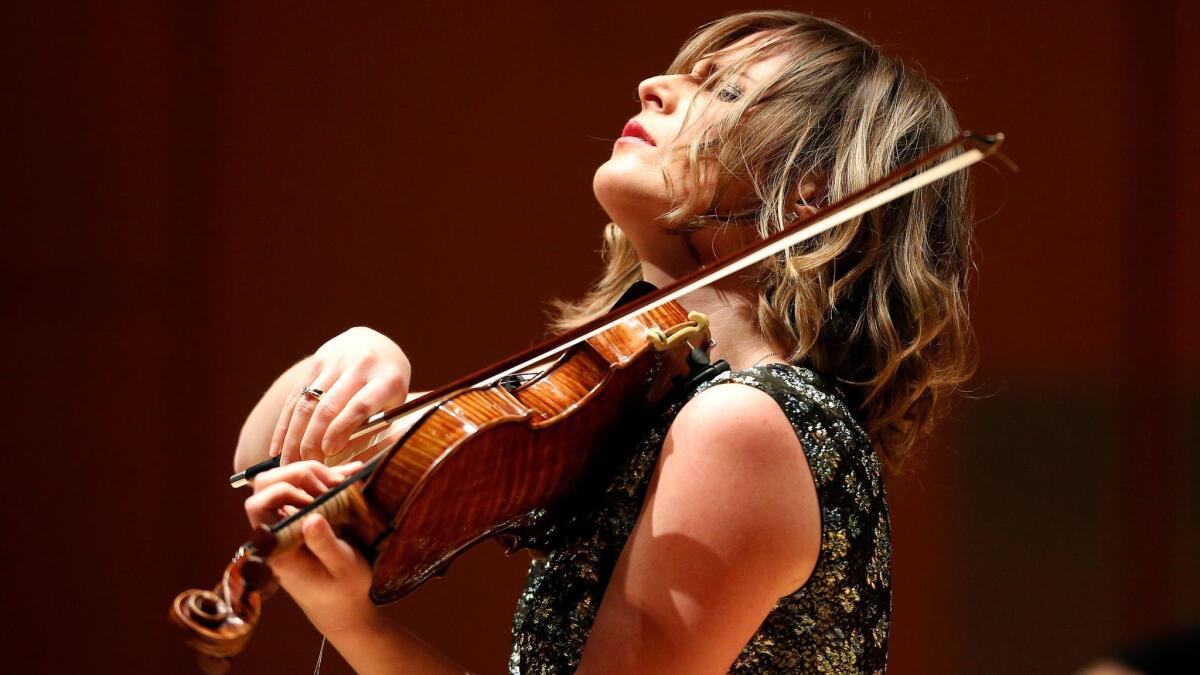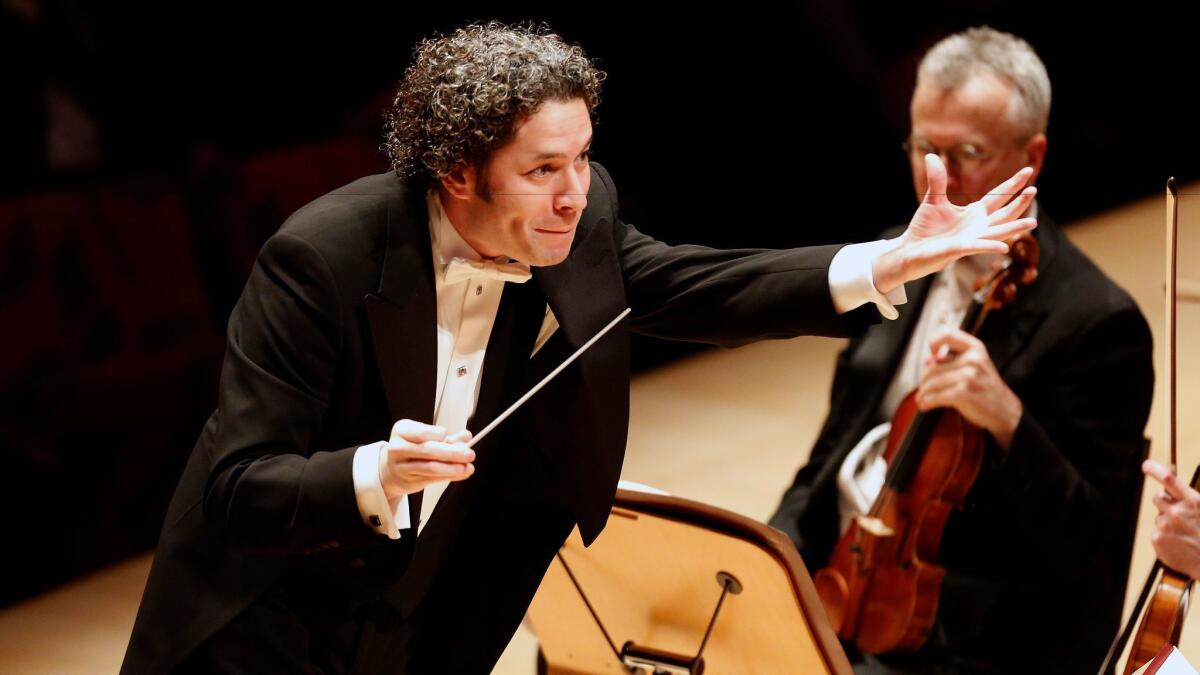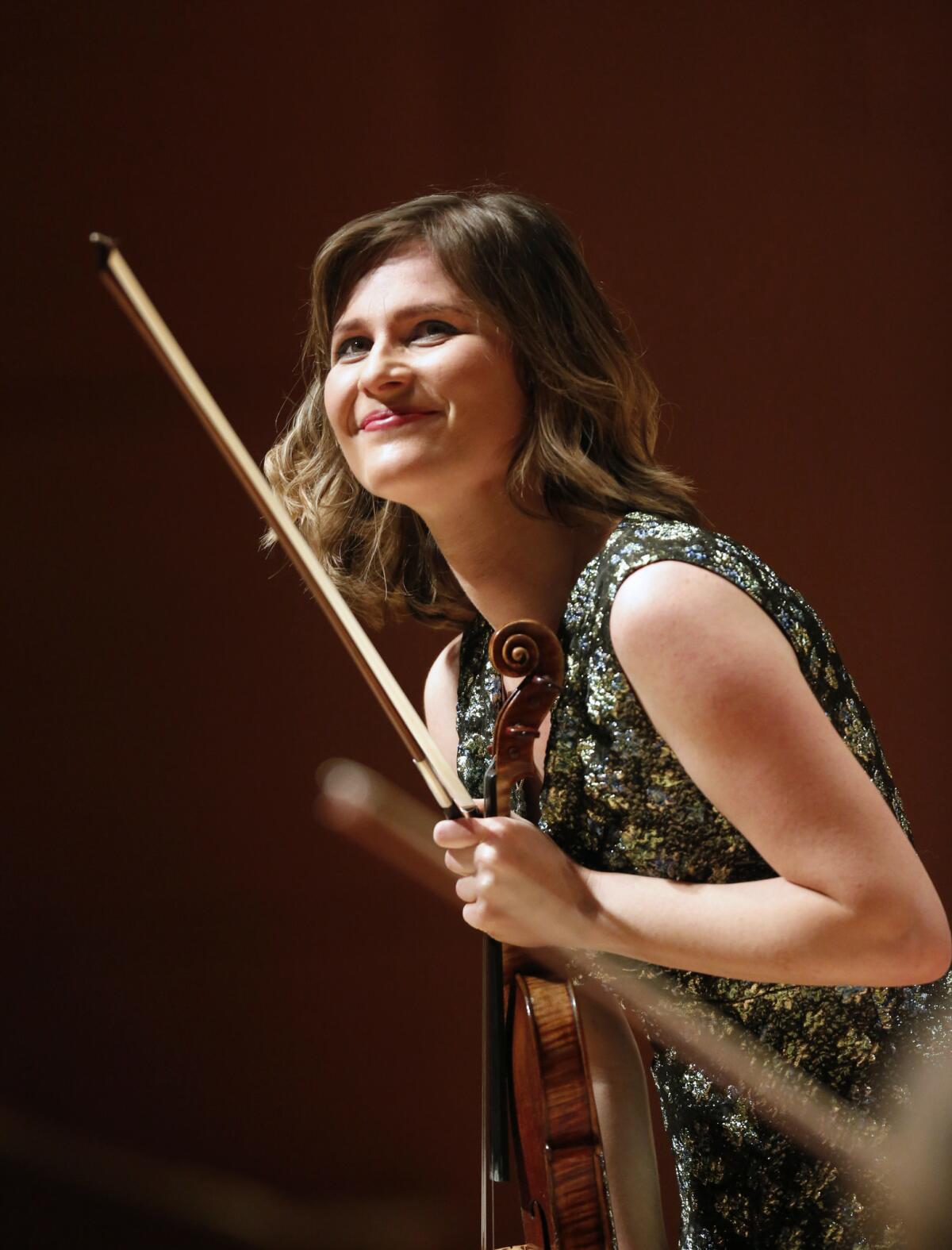Review: The Los Angeles Philharmonic and those Russians

- Share via
A concert like the
It was indeed easy to lose one’s self in compelling performances of Russian music, but not because it was escape. Just the opposite.
------------
FOR THE RECORD
Feb. 6, 10 a.m.: This review cites the incorrect year Alfred Schnittke’s “(K)ein Sommernachtstraum” was composed. The piece was written in 1984-85, not 1995.
------------
None of the evening’s three pieces were music as music, certainly not Prokofiev’s “Romeo and Juliet” or Alfred Schnittke’s slyly dissident “(K)ein Sommernachtstraum,” not even Tchaikovsky’s concerto. Instead, each represented a composer’s political or social or personal reaction to his time.
Beyond all that, the concert happened to be an excellent example of why classical arts can be of particular usefulness. In times of public perplexity, media bombardment makes the moment seem exceptional. But it never hurts to put ourselves into the minds of great minds who have dealt with similar issues.

Tchaikovsky’s Violin Concerto, the oldest and least programmatic of Thursday’s three works, might seem the least relevant. Its familiarity also makes it the easiest to take for granted. According to a survey by Bachtrack, the reliable classical music website, Tchaikovsky’s concerto was the third most-played classical composition in 2016, after Beethoven’s fifth and seventh symphonies.
New recordings keep coming out, practically monthly, no matter a surfeit of performances by great violinists over the years. Yet three exceptional recent releases, all featuring women soloists born between 1976 and 1979, have provided startling illumination.
The one generating the most controversy is a dizzyingly unpredictable and almost unbearably exciting reinterpretation by violinist Patricia Kopatchinskaja, a forthcoming Ojai festival music director. At the other extreme is an eloquently pristine, yet no less haunting, performance from Jennifer Koh. Each offers a side of Tchaikovsky — his emotional instability and musical control.

Batiashvili falls somewhere in between. She and Dudamel, who demonstrated a strong musical chemistry, began the concerto with sweet poise for one of those memorable Tchaikovskian melodies that the composer makes you remember because (unstable of mind?) he never brings it back. He’s off, on to other soulful, contentious and sometimes vodka-soaked things — Tchaikovsky was recovering from a disastrous marriage in Switzerland in the spring of 1878 and perhaps dreaming of a forbidden love for a young violinist.
Batiashvili, whose technique is impeccable and whose tone is richly soulful, was there for all the emotional and violinistic swings. She dreamed with Tchaikovsky and escaped with Tchaikovsky and threw it all to the wind when that seemed a thrilling thing to do.
She also reminded us, as we need reminding, that there is nothing new with the wider world’s longstanding compulsion to come to terms with Russia, to say nothing of Russians’ own longstanding attempts to do the same.
If the dissidence in a violin concerto by a composer favored by the czar was entirely interior, Prokofiev’s 1935 “Romeo and Juliet” was the humanist ballet score that a onetime firebrand composer hoped would help his cause as repatriated member of Soviet society. In the concert hall, conductors like to show otherwise. They bring out all kinds of curious and even subversive instrumental details that inevitably get lost when played in the pit by an indifferent ballet orchestra needing to accommodate the needs of dancers and choreographers.
Dudamel, on the other hand, treated this not as symphonic music (although there was plenty of symphonic sweep) but as an idealized ballet. The atmosphere he created for the young lovers was exquisite. The drama, intense. Soft was barely audible. Loud was such that you saw wind players putting in ear plugs to protect themselves from the horns, and then horn players covering ears to protect themselves from the percussion.
Dudamel found tempos, particularly for the young Juliet, quicker than a dancer could likely handle, but the image in the mind’s eye was vivid. The explosive eruptions for battling Montagues and Capulets, and for the death of Tybalt, had the impact of a movie theater Dolby-ized for overblown screen explosions.
Schnittke’s dissidence for his 1995 “(K)ein Sommernachtstraum” is far quirkier. The title is a pun translated as “(Not) A Midsummer’s Night Dream.” It begins with audience members craning their heads trying to find who in the last row of the second violins (Yun Tang) is elegantly playing an innocent Rococo-style tune.
I will mention that the orchestra is wastefully huge (for an 11-minute opener) and includes plenty of brass, plenty of percussion and piano, harpsichord and celesta. But if you want to know what happens next, you should do what you can to find out at one of the remaining performances.
Los Angeles Philharmonic
Where: Walt Disney Concert Hall, 111 S. Grand Ave., Los Angeles
When: 8 p.m. Friday and Saturday, 2 p.m. Sunday
Tickets: $69-$200
Information: (323) 850-2000 or www.laphil.org
UPDATES:
For the record
6:45 p.m. Feb. 5: Alfred Schnittke’s “(K)ein Sommernachtstraum” was composed in 1984-85, not 1995.
The biggest entertainment stories
Get our big stories about Hollywood, film, television, music, arts, culture and more right in your inbox as soon as they publish.
You may occasionally receive promotional content from the Los Angeles Times.








